I enjoy watching the birds at my feeders, but this was a much more entertaining activity in the mid-1990s when I first began feeding birds. I still remember the first time these large, chunky finches arrived, literally just outside my bedroom window. That was back in November of 1993, but I still recall the incident quite clearly. I was still in bed when I heard some unusual bird sounds that I could not recognize. About a dozen or so large yellow songbirds fought with each other for dominance in the “pecking order” hierarchy at my feeders, which were well-stocked with sunflower seed. I am describing the male Evening Grosbeak. The female is more subdued. These hungry birds quickly emptied my small hanging feeders. For several consecutive winter seasons in the 1990s, I hosted Evening Grosbeaks at my feeders. I last saw an Evening Grosbeak in 2000. These large, noisy and conspicuous finches have simply not visited in the last 12 years. At the start of each winter season, I am hopeful that this might be the year the Evening Grosbeaks return. So far, that’s not been the case.
By Bryan Stevens, Elisabethton Star, January 23rd, 2012
http://www.starhq.com/2012/01/23/another-winter-and-still-no-evening-gr…
The Evening Grosbeak (Coccothraustes vespertinus) is a large finch. The breeding habitat is coniferous and mixed forest across Canada and the western mountainous areas of the United States and Mexico. The migration of this bird is variable; in some winters, it may wander as far south as the southern U.S. These birds forage in trees and bushes, sometimes on the ground. They mainly eat seeds, berries and insects. Outside of the nesting season they often feed in flocks.
Source:
Wikepedia
http://en.wikipedia.org/wiki/Evening_Grosbeak

- Login om te reageren
